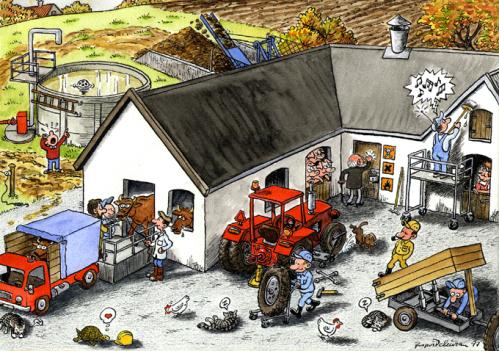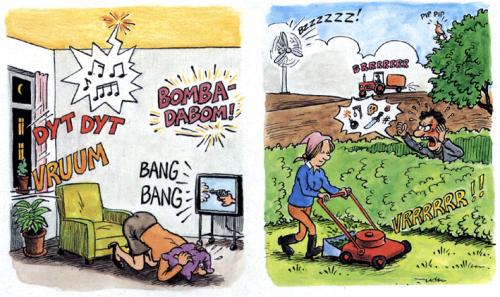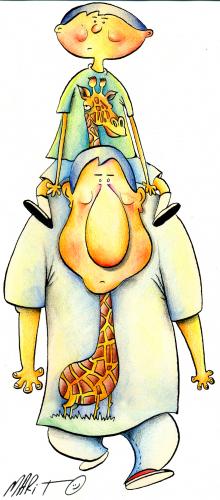Countable and Uncountable Nouns
Countable nouns are words like book, table, cat. They are the names of the things you can count. You can say ‘one book’, ‘two tables’, ‘three cats’.
Countable nouns can be singular (a car, one book) or plural (two dogs, lots of people, ten houses)
Uncountable nouns are words like oil, rice, sand, water. Theses are things that you can’t count.
You can say sand, but NOT ‘one sand’ or ‘two rices’ or ‘three oils’.
Uncountable nouns are only singular.
Countable nouns can be singular (a car, one book) or plural (two dogs, lots of people, ten houses)
Uncountable nouns are words like oil, rice, sand, water. Theses are things that you can’t count.
You can say sand, but NOT ‘
Uncountable nouns are only singular.
Look at the following list of nouns and write them in the correct group in the table.
| ·rain ·children ·microphone ·bird ·music | ·cups ·women ·mouth ·phones ·blood | ·ice ·meat ·songs ·mountains ·desk | ·love ·sofa ·river |
singular countable nouns
|
plural countable nouns
|
uncountable nouns
| ||||
Countable | Uncountable | |
| There are a lot of peanuts* There are not many peanuts Are there many peanuts? There are too peanuts There are far too many peanuts There are few peanuts There are a few peanuts There are peanuts There are too peanuts There are far too few peanuts There are more peanuts There are peanuts There are a little more peanuts There are fewer peanuts | There is a lot of beer* There is not beer Is there much beer? There is too much beer There is beer There is little beer There is beer There is very little beer There is too little beer There is far too little beer There is beer There is much more beer There is beer There is beer | |
| *peanuts = cacahuetes (maní) (peanuts are countable) | *beer = cerveza (beer is a liquid and, like coffee, wine, sater, oil, etc. it is an uncountable noun) |
Choose the best uncountable noun for each sentence.
Consulta las soluciones| 1. I’ve got too much and not enough free time at the moment. I’m feeling really stressed. 2. I love your antique . Did it belong to your grandparents? 3. I called my accountant to get some on this new contract we’re supposed to sign. I honestly don’t know what to do. 4. I didn’t expect you to arrive with so much . Why do you need 3 suitcases? 5. They say that ‘ broadens the mind’. In my case it certainly empties the wallet! 6. Let’s go to that Italian restaurant in the centre. I really fancy some tonight. 7. Do you mind if I put the BBC on? I want to catch up with the . 8. Excuse me. Is there anyone who can give me some on train times?. |
http://www.mansioningles.com/
http://www.mansioningles.com/
http://www.mansioningles.com/
NOUNS ARE DIVIDED IN : countable and uncountable.
Countable nouns are things you can count.
For example: three pears
one pear
 two pears
two pears Countable Nouns: Can be used in Singular and Plural.
For example:
Singular Plural
Uncountable nouns are things you see as a whole, things you can not count.
Uncountable nouns has only one form.
For example:
 water
water| NOTE: money is considered as an uncountable noun.Example: I don´t have money. Susan has much money. |
Let's practice what you have learned. Click on the next exercises.
Exercise 1
Exercise 2
Es hora de Reflexionar:
1.- ¿Puedes definir rápida y brevemente qué es un sustantivo contable "countable noun"?
2.- ¿Puedes definir rápida y brevemente qué es un sutantivo incontable "uncountable noun"?
Si pudiste hacerlo fácilmente !Felicidades! sino es así reflexiona sobre lo siguiente:
¿Entendiste la diferencia entre un contable y un incontable?
Si tu respuesta es afirmativa !adelante!
Si tu respuesta es negativa probablemente necesitas trabajar en los siguientes aspectos. Haz clic en las direcciones que aparecen y elabora los ejercicios.
Vocabulario sobre comida.
Links:
http://www.mansioningles.com/ejer_voc43.htm
http://www.mansioningles.com/ejer_voc35.htm

Resolver más ejercicios.
Links:
http://www.mansioningles.com/nc_lec13_3.htm
Rutas de Aprendizaje: Material de Auto-acceso
| Food vocabulary | Idiomas Sin Fronteras Cursi 1 CD/ New York/ Chinatown/Ejer. 1-2 |
| Food Vocabulary | Listen carefully/Unit 4/page 14-15/ejer. 1-5 |
| Food Vocabulary | The new grammar in action 1/UNIT 9/page 74/ejer. A |
| Countable and Uncountable Nouns. | Grammar Spectrum 1/Unit 9/Ejer. 3-5 |
| Countable and Uncountable Nouns. | The New Grammar in Action1/UNIT 9/ Page 80/ejer. A&B |
| Countable and Uncountable Nouns. | The New Grammar in Action1/UNIT 9/ Page 76/ejer.C |
- Too much/too many (9)
- Had better (10)
- Word order. Do/does (4)
- Irregular verbs (2)
- Match verbs/adjetives (2)
I don't often eat fish

Basic foods
Alimentos esenciales |
Escucha al profesor leyendo oraciones sobre los alimentos esenciales. Repítelo luego simultáneamente...
| ||
 |
These are bananas.
Estas son bananas. |  |
This is pasta.
Esto es pasta. | |
 |
These are oranges.
Estas son naranjas. |  |
This is bread.
Esto es pan. | |
 |
These are apples.
Estas son manzanas. |  |
These are beans.
Estos son porotos (alubias). | |
 |
These are strawberries.
Estas son frutillas (fresas). |  |
This is rice.
Esto es arroz. | |
 |
These are mangoes.
Estos son mangos. |  |
These are potatoes.
Estas son papas. |
 |
These are carrots.
Estas son zanahorias. |  |
This is milk.
Esto es leche. | |
 |
These are tomatoes.
Estos son tomates. |  |
These are eggs.
Estos son huevos. | |
 |
This is broccoli.
Esto es brócoli. |  |
This is cheese.
Esto es queso. | |
 |
These are green beans.
Estas son habas. |  |
This is butter.
Esto es manteca. | |
 |
These are peppers.
Estos son ajíes. |  |
This is yogurt.
Esto es yogur. |
En inglés americano la palabra tomatoes se pronuncia toméitous y en inglés británico se lee tomátous.
|
 |  |  |  |  | ||||
This is chicken
|
This is
lamb |
This is
beef |
This is
shrimp |
This is
salmon | ||||
Esto es
pollo |
Esto es carne de cordero
|
Esto es carne vacuna
|
Esto es
camarón |
Esto es
salmón |
| |||||
¿OTROS ALIMENTOS?
| |||||
Quizás quieras saber cómo se dice en inglés migas de pan, tallarines, crema pastelera, abadejo, centolla, ravioles de carne, hinojo, alcaparras, nísperos, jugo de carne, codorniz, etc.
| |||||
En los ENLACES UTILES que siempre sugerimos encontrarás diferentes alternativas para aumentar tu vocabulario. Y recuerda que cuantas más palabras aprendas, más podrás enriquecerlo. Aquí van:
| |||||
En las listas descolgables hay 25 elementos o productos que debes distribuir en cinco categorías alimentarias. NO DEBES REPETIR ningún elemento o producto en las celdas. Verifica luego las respuestas correctas ...
|
FRUIT
Frutas |
VEGETABLES Verduras
|
STARCHES
Féculas |
DAIRY
Lácteos |
MEAT & FISH
Carne y pescado | ||||
Countable vs. Uncountable
Contables vs. No contables |
Escucha al profesor leyendo SUSTANTIVOS CONTABLES y NO CONTABLES. Repítelo luego simultáneamente.
| ||
COUNTABLE
|
CONTABLES
|
SINGULAR
|
PLURAL
| ||
an apple
|
apples
|
I'm eating an apple.
| |
una manzana
|
manzanas
|
Estoy comiendo una manzana.
| |
a carrot
|
carrots
|
Apples are my favorite fruit.
| |
una zanahoria
|
zanahorias
|
La manzana es mi fruta favorita.
| |
a potato
|
potatoes
|
I like apples.
| |
una papa
|
papas
|
Me gustan las manzanas.
|
UNCOUNTABLE
|
NO CONTABLES
|
SINGULAR ONLY
| ||
yogurt
|
I'm eating yogurt.
| |
yogur
|
Estoy comiendo yogur.
| |
beef
|
Yogurt is delicious.
| |
bife
|
El yogur es delicioso.
| |
broccoli
|
I love yogurt.
| |
brócoli
|
Me encanta el yogur.
|
 |
¿Los sustantivos pueden ser CONTABLES y NO CONTABLES? ¿Cómo es eso? A ver cómo se las arregla Mr. Grammar...
|
| |||||||||
COUNTABLE NOUNS (SUSTANTIVOS CONTABLES)
| |||||||||
Por ejemplo: (a) car - (un) auto; (a) flower - (una) flor; (an) apple - (una) manzana. Puedes usar esta fórmula: ONE/TWO/THREE + COUNTABLE NOUN (uno/dos/tres...+ sustantivo contable). Puedes usarlos de este modo porque los PUEDES CONTAR; puedes contar ONE car, TWO flowers, THREE apples, etc. (UN auto, DOS flores, TRES manzanas, etc..).
| |||||||||
Los sustantivos contables pueden estar en SINGULAR (= one, uno) o en PLURAL (= two or more, dos o más). Veamos estos ejemplos:
SINGULAR: a car, my car, the car, etc. (un auto, mi auto, el auto, etc.) PLURAL: cars, two cars, the cars, some cars, many cars, etc. (los autos, dos autos, los autos, unos o algunos autos, muchos autos, etc.). | |||||||||
OBSERVA AHORA ESTAS CURIOSIDADES GRAMATICALES:
| |||||||||
Habrás observado tres líneas arriba que cars y the cars se tradujo en ambos casos como los autos. Veamos:
| |||||||||
a) Cuando te refieres a "los autos" EN GENERAL, es decir a TODOS los automóviles del mundo NO DEBES USAR el artículo definido the: CARS are expensive (LOS AUTOS son caros). Lo mismo ocurre con cualquier otro sustantivo: ELEPHANTS don't fly (LOS ELEFANTES no vuelan); ARGENTINIANS eat too much meat (LOS ARGENTINOS consumen demasiada carne).
| |||||||||
b) Cuando te refieres a "los autos" EN PARTICULAR (es decir a los automóviles de los cuales estás hablando) DEBES USAR el artículo definido the: He's buying THE CARS (Está comprando LOS AUTOS). Se supone que está comprando los autos acerca de los cuales nos estuvo hablando en algún momento.
| |||||||||
ULTIMA OBSERVACION DE ESTE PUNTO:
| |||||||||
NO DIGAS:
DEBES DECIR: I don't have a car. | |||||||||
| |||||||||
UNCOUNTABLE NOUNS (SUSTANTIVOS NO CONTABLES)
| |||||||||
Por ejemplo: water - agua; rain - lluvia; rice - arroz; money - dinero, etc.
| |||||||||
NO PUEDES USAR la fórmula ONE/TWO/THREE + UNCOUNTABLE NOUN (water/rain/rice, etc.). NO PUEDES DECIR:
| |||||||||
LOS SUSTANTIVOS NO CONTABLES TIENEN UNA UNICA FORMA:
| |||||||||
money, the money, my money, some money, much money, etc.
| |||||||||
Ejemplos:
I have some money (Tengo algún/algo de dinero); There isn't much money here (No hay mucho dinero aquí); Money isn't everything (El dinero no lo es todo). | |||||||||
ULTIMA OBSERVACION DE ESTE PUNTO:
| |||||||||
NO PUEDES USAR LA FORMULA A/AN + UNCOUNTABLE NOUNS:
| |||||||||
PERO EN CAMBIO PUEDES EXPRESARLO DEL SIGUIENTE MODO:
| |||||||||
a piece of cheese (un trozo de queso);
a piece of music (un fragmento de música); a glass of water (un vaso de agua); a bar of chocolate (una barra de chocolate); a game of tennis (un partido de tennis). | |||||||||
Es decir mencionando siempre la menor unidad del sustantivo (trozo, fragmento, vaso, barra, partido, etc).
| |||||||||
Intenta ahora ESCRIBIR en forma correcta estas oraciones en las celdas basándote en las explicaciones de Mr. Grammar. Verifica luego las respuestas correctas ...
|
1.
|
I don't have car.
| |
2.
|
A potatoes aren't expensive.
| |
3.
|
Ann never wears hat.
| |
4.
|
Are you looking for job?
| |
5.
|
Mary doesn't eat a meat.
| |
6.
|
I'm going to party tonight.
| |
7.
|
Do you like a cheese?
| |
8.
|
Do you want cup of coffee?
| |
9.
|
I have great idea.
| |
10.
|
Peru is country in South America.
|
En las listas descolgables hay 24 elementos o productos que debes distribuir en dos categorías gramaticales. NO DEBES REPETIR ningún elemento o producto en las celdas. Verifica luego las respuestas correctas ...
|
COUNTABLES
Contables |
UNCOUNTABLES
No Contables | |
Aquí tienes seis oraciones en las cuales deberás SELECCIONAR la opción más adecuada. Como ejercicio de audio-comprensión escucha al final (NO ANTES) el archivo de sonido. Verifica luego las respuestas correctas ...
| ||
1. Strawberries my favorite fruit. I love strawberries!!
|
2. I think mangoes delicious.
|
3. Grean beans my favorite vegetable.
|
4. Broccoli very good for you.
|
5. I think cheese awful. I hate cheese!!
|
6. Chicken my favorite meat.
ONLINE EXERCISES – EJERCICIOS EN LINEA: Identify if the noun is countable or uncountable (Identificar si el sustantivo es contable o no) -http://www.usingenglish.com/quizzes/210.html -http://www.usingenglish.com/quizzes/210.html There is or there are? - http://www.better-english.com/easier/counta.htm |








No hay comentarios:
Publicar un comentario